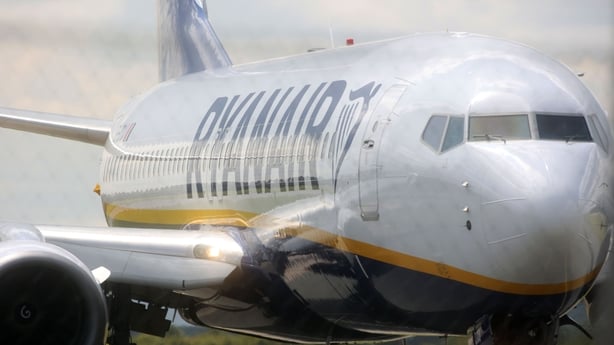Ryanair achieved close to record full-year profit in the year to March 31 and said it is cautiously optimistic that robust summer demand will ensure modest profit growth in the next 12 months despite fuel costs being less "fortuitously" hedged.
Europe's largest airline by passenger numbers expects 10% traffic growth this year to more than offset a €1 billion rise in its oil bill.
This comes as it posted slightly better than expected annual post-tax earnings of €1.43 billion today.
Ryanair said it stands to gain more from peak summer fares "trending ahead of last year", with summer European short-haul capacity set to be 5-10% below pre-pandemic levels.
"There is no doubt in my mind that people who have been locked up for the two years of Covid are going back traveling," group chief executive Michael O'Leary said in a presentation to investors.
"They see travel not as a luxury but as an essential and families are returning to the beaches of Europe this summer," he added.
Other major European airlines, most recently low-cost rival EasyJet, have all pointed to robust summer bookings, showing consumers prioritising travel despite incomes being squeezed by higher inflation.
Ryanair shares are up 27% so far this year and were higher in Dublin trade today.
Michael O'Leary cautioned that he was not entirely sure if that would continue and that winter and early 2024 may be more challenging.
However, he added that a large backlog of aircraft deliveries is likely to constrain European capacity growth for at least four more years and create "enormous growth opportunities" for Ryanair as it adds 110 new Boeing jets over the next three summers.
Boeing delivery delays could push some of its expected growth into the lower yielding second half of this year and require capacity to be trimmed judiciously, he said, with the carrier expecting to be short of up to 10 new jets in June and July.
Finance chief Neil Sorahan said that the airline remained comfortable it would increase passenger numbers to 185 million from a record 168.6 million in the past financial year.
We need your consent to load this rte-player contentWe use rte-player to manage extra content that can set cookies on your device and collect data about your activity. Please review their details and accept them to load the content.Manage Preferences
"We're seeing huge demand for travel [this year]," he said, speaking on RTÉ's Morning Ireland. "As we look into peak summer, pricing and bookings are running ahead of the prior year.
"We'd be comfortable that we would hit that target, subject to Boeing getting all of their aircraft to us on time."
A delivery delay could potentially reduce first-half passenger numbers by 750,000, the airline said.

Michael O'Leary expects all the aircraft needed for summer 2024 to arrive by the end of next May and that deliveries will be "smoother" next summer.
A multibillion-dollar deal struck with Boeing this month for as many as 300 jets will allow traffic to grow to 300 million passengers a year by March 2034, Ryanair has predicted.
Ryanair's €1.43 billion full-year post-tax profit was slightly better than analyst expectations and its own forecast of €1.425 billion.
The company made a loss of €355m in last year's pandemic-hit financial year but its turnaround came close to topping the record €1.45 billion profit achieved in the year to March 31, 2018.
Its revenues for the year jumped by 124% from €4.8 billin to €10.78 billion, while it opened five new bases and about 300 new routes were started during the year.
Total operating costs rose 75% to €9.20 billion, driven by higher fuel costs - which was offset by favourable fuel hedges and improved fuel burn as more new planes entered its fleet - crew pay restoration and 74% traffic growth.
In its results Ryanair also said it continued to make progress in becoming carbon neutral, and said passengers could cut their emissions by 50% by switching to its service.
However the scale of the business means that it is still one of the Europe's biggest pollutors.
NGO Transport and Environment recently labelled Ryanair as Europe's most polluting airline, due to its 13.3 million tonne carbon burn last year.
"We've set an ambitious target for ourselves between now and 2030 to cut Co2 per passenger kilometer by 10%," said Mr Sorohan. "And we're looking potentially, on the back of the new Gamechanger follow-on order, the MAX10, which is 20% more fuel efficient - cutting that even further beyond 2030.
"If you look at sustainalitics, they have ranked Ryanair the number 1 airline for ESG."
But while Ryanair's emissions per passenger kilometer may be falling, its growth ambitions mean that its overall carbon footprint is likely to continue to rise.
It is targetting 300 million passengers by 2034 - a 77% increase on its most recent figure.
However Mr Sorohan said that growth would come at the expense of its less efficient rivals, which would help reduce emissions across the industry.
"You're seeing capacity coming out from other airlines as people migrate over to the more fuel efficient airline in Europe," he said.
He also repeated Ryanair's long-standing complaint that long haul aviation is excluded from European emissions targets, despite it having a larger carbon footprint than short-haul travel.

